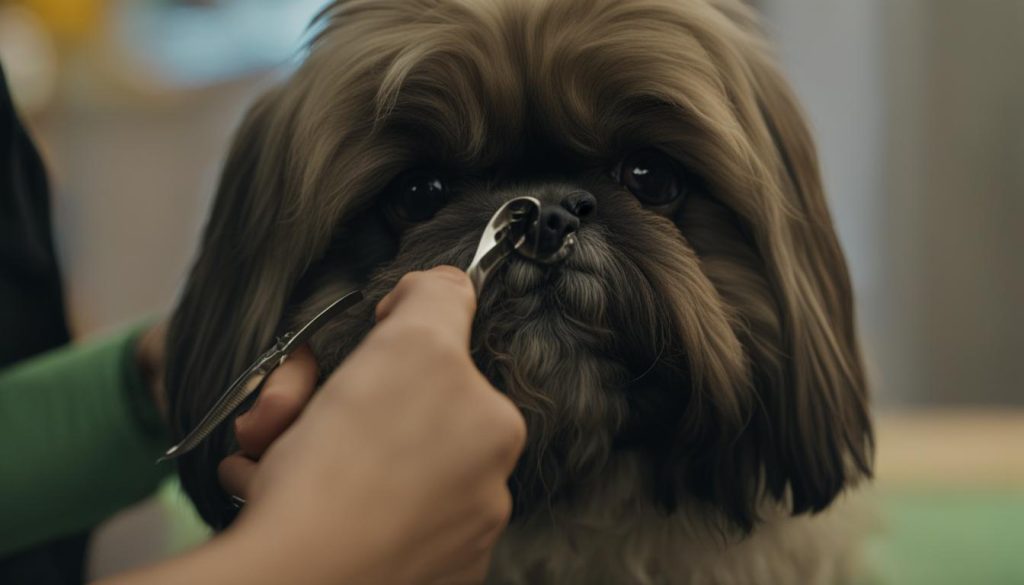As a professional journalist, I have encountered many different dog breeds throughout my career. While each breed has its own unique characteristics and challenges, there is one breed that stands out as particularly difficult: the Shih Tzu. In this article, I will explore why Shih Tzus are often considered the worst dogs to own.
Shih Tzus are certainly adorable with their fluffy coats and expressive eyes. However, behind their cute appearance lies a multitude of challenges that can make them a handful for even the most experienced dog owner.
From their high maintenance grooming needs to their potential health issues, stubbornness, difficulty with housebreaking, and excessive barking, Shih Tzus can test the patience and commitment of any dog lover.
Key Takeaways:
- Shih Tzus require daily grooming and regular trips to the groomer to prevent matting and shedding.
- They are prone to various health issues, including eye disorders, respiratory problems, and dental issues.
- Housebreaking a Shih Tzu can be a challenging task due to their stubborn nature.
- Shih Tzus are known for their excessive barking and noise-making.
- Separation anxiety is common among Shih Tzus, leading to stress and negative behaviors when left alone.
High Maintenance Grooming Needs

When it comes to grooming, Shih Tzus are in a league of their own. Their long, silky coats require daily brushing to prevent matting and tangling. Neglecting their grooming needs can result in painful skin infections and discomfort for the dog. In addition to daily brushing, regular trips to the groomer are necessary to keep their coats looking their best. Shih Tzus also shed a considerable amount, so frequent vacuuming is essential to maintain a clean living space.
To give you an idea of the grooming commitment required, a study published in the American Journal of Veterinary Research found that Shih Tzus spend an average of 14 hours per month on grooming, compared to just 2 hours for many other dog breeds. This high maintenance requirement can be overwhelming for busy pet owners or those who prefer low maintenance pets.
Furthermore, regular exercise is crucial for Shih Tzus to keep them healthy and prevent behavioral issues. A sedentary lifestyle can lead to weight gain, muscle atrophy, and an increase in destructive behaviors. To meet their exercise needs, daily walks and playtime are recommended.
| Grooming | Exercise |
|---|---|
| Regular brushing to prevent matting and tangling | Daily walks and playtime |
| Regular trips to the groomer | Frequent exercise to prevent weight gain |
| High shedding levels requiring frequent vacuuming | Maintaining a consistent exercise routine |
Shih Tzus have a grooming requirement that demands significant time and effort from their owners. If you are considering adopting a Shih Tzu, be prepared for the commitment involved in keeping their coat healthy and maintaining an exercise routine. It’s important to carefully evaluate whether you have the time and resources to meet their grooming and exercise needs.
Prone to Health Problems

Shih Tzus are known to be susceptible to various health issues, requiring attentive care and regular check-ups. Some of the common health problems that affect Shih Tzus include:
- Eye Disorders: Shih Tzus are prone to eye problems such as cataracts, corneal ulcers, and progressive retinal atrophy. These conditions can lead to vision impairment and require specialized treatment.
- Respiratory Problems: Due to their short snouts and flattened faces, Shih Tzus can suffer from respiratory issues such as brachycephalic airway syndrome. This can cause difficulty breathing, snoring, and increased risk of heat stroke.
- Dental Problems: Shih Tzus have small mouths and often experience dental issues like tooth decay, gum disease, and tooth loss. Regular dental care, including teeth brushing and professional cleanings, is crucial to maintain their oral health.
- Allergies: Shih Tzus are prone to allergies, which can manifest as skin irritations, itchiness, and recurrent ear infections. Identifying and managing allergens through proper diet and medication is essential for their well-being.
It is important to note that not all Shih Tzus will experience these health problems, but the breed is genetically predisposed to them. Regular veterinary care, a balanced diet, and a healthy lifestyle can help mitigate the risks and ensure the overall health of your Shih Tzu.
| Health Issue | Description | Treatment |
|---|---|---|
| Eye Disorders | Includes cataracts, corneal ulcers, and progressive retinal atrophy | Specialized treatment, surgery, and monitoring |
| Respiratory Problems | Brachycephalic airway syndrome, difficulty breathing, snoring | Medication, lifestyle adjustments, and monitoring |
| Dental Problems | Tooth decay, gum disease, tooth loss | Regular dental care, teeth brushing, professional cleanings |
| Allergies | Skin irritations, itchiness, recurrent ear infections | Identifying and managing allergens, dietary changes, medication |
Eye Disorders
Shih Tzus are prone to various eye disorders, including cataracts, corneal ulcers, and progressive retinal atrophy. These conditions can lead to vision impairment and significantly impact the quality of life for the affected dog. It is important to monitor your Shih Tzu’s eye health closely and seek veterinary care if you notice any signs of discomfort or visual disturbances.
Respiratory Problems
Shih Tzus have a brachycephalic (short-snouted) structure, which can result in respiratory problems. This includes conditions like brachycephalic airway syndrome, which can cause difficulty breathing, snoring, and increased risk of heat stroke. It is essential to keep Shih Tzus in a cool and well-ventilated environment, avoid strenuous activities in hot weather, and provide them with regular breaks for rest and relaxation.
Dental Problems
Due to their small mouths and overcrowded teeth, Shih Tzus are prone to dental problems such as tooth decay, gum disease, and tooth loss. Regular dental care, including daily teeth brushing and professional cleanings, is crucial to maintain optimal oral health. Providing appropriate dental chews and toys can also help promote dental hygiene and reduce the risk of dental issues.
Allergies
Shih Tzus can be susceptible to allergies, which can manifest as skin irritations, itchiness, and recurrent ear infections. Allergies can be triggered by various factors, including food, environmental allergens, and flea bites. Identifying the specific allergen and implementing an appropriate management plan in consultation with a veterinarian is essential to provide relief and improve the quality of life for your Shih Tzu.
Housebreaking a Shih Tzu: Challenges and Tips

When it comes to housebreaking a Shih Tzu, owners often face unique challenges due to the breed’s stubborn nature and independent personality. Proper training and consistency are key to successfully housebreaking a Shih Tzu and preventing accidents in the house. Here are some common challenges faced and useful tips to overcome them:
Challenges:
- Stubbornness: Shih Tzus are known for their stubbornness, which can make them resistant to training commands and housebreaking efforts. They may ignore signals to go outside or choose to eliminate indoors if not properly trained.
- Small Bladder: Shih Tzus have relatively small bladders, which means they need more frequent bathroom breaks compared to larger breeds. Failure to provide adequate opportunities for elimination can result in accidents.
- Separation Anxiety: Shih Tzus are prone to separation anxiety, which can manifest as house-soiling behaviors when left alone. They may eliminate indoors as a response to stress and anxiety.
Tips for Successful Housebreaking:
- Establish a Routine: Create a consistent schedule for feeding and bathroom breaks to help your Shih Tzu understand when it’s time to go outside. Take them out first thing in the morning, after meals, and before bedtime.
- Positive Reinforcement: Use positive reinforcement techniques, such as treats and praise, to reward your Shih Tzu for eliminating outdoors. This will reinforce the desired behavior and motivate them to continue doing so.
- Patience and Consistency: Housebreaking takes time and patience. Be consistent with your training methods and don’t get discouraged by occasional accidents. Stay calm and avoid punishment, as it can create fear and hinder the training process.
- Crate Training: Consider crate training your Shih Tzu to provide them with a designated safe space and prevent accidents when unsupervised. Make sure the crate is appropriately sized and comfortable for your dog.
- Potty Pads: Utilize potty pads or artificial grass pads indoors during the initial stages of housebreaking, gradually moving them closer to the door for eventual outdoor elimination.
To sum up, housebreaking a Shih Tzu may present some challenges, but with patience, consistency, and positive reinforcement training, it is possible to achieve success. Remember to establish a routine, be patient with your Shih Tzu’s stubbornness, and provide plenty of opportunities for outdoor elimination. By following these tips and providing the right environment, you can successfully housebreak your Shih Tzu and enjoy a clean and accident-free home.
Prone to Noise and Barking

Shih Tzus are known for their excessive barking and noise-making tendencies. These small but vocal dogs have a heightened sensitivity to sounds and may bark at anything that catches their attention. Whether it’s the doorbell ringing, a car passing by, or even the rustling of leaves, Shih Tzus have a knack for expressing themselves through barking. This can be a cause of frustration for owners and their neighbors, especially in noise-sensitive environments or crowded living situations.
To manage their barking behavior, it is essential to provide proper training and socialization from an early age. Positive reinforcement techniques, such as rewarding quiet behavior and redirecting their attention, can help curb excessive barking. Engaging them in mentally stimulating activities and providing plenty of physical exercise can also help reduce their tendency to bark out of boredom or anxiety.
Additionally, addressing the root causes of their barking, such as separation anxiety or fear, can also help alleviate the problem. Identifying triggers and implementing desensitization exercises can gradually reduce their sensitivity to certain sounds and minimize their barking response. It’s important to remember that Shih Tzus are intelligent dogs who thrive on attention and companionship, so neglecting their emotional needs can exacerbate their barking tendencies.
| Noise and Barking Challenges | Management Strategies |
|---|---|
| Excessive barking at various stimuli | Positive reinforcement training |
| Noise sensitivity | Desensitization exercises |
| Separation anxiety-related barking | Addressing the root cause of anxiety |
| Boredom-induced barking | Mentally stimulating activities and plenty of exercise |
By approaching the issue of excessive barking with patience, consistency, and a proactive approach to training, owners can manage this common challenge associated with Shih Tzus. It is crucial to remember that barking is a natural behavior for dogs, but excessive barking can be disruptive and cause stress. With the right guidance and training, Shih Tzus can learn to communicate effectively without resorting to constant noise-making.
Susceptible to Separation Anxiety

Shih Tzus are known for their loving and loyal nature, but they are also susceptible to separation anxiety. When left alone for extended periods, these dogs can become stressed and exhibit negative behaviors. Separation anxiety is a common issue among many breeds of dogs, including Shih Tzus, and it is important for owners to understand how to address and manage this condition.
Separation anxiety in dogs is characterized by excessive distress and anxiety when they are separated from their owners or left alone. Shih Tzus, in particular, can become very attached to their human companions and may struggle to cope with their absence. Common signs of separation anxiety in Shih Tzus include excessive barking, destructive behavior, house soiling, and attempts to escape.
To help reduce separation anxiety in Shih Tzus, it is important to gradually acclimate them to being alone. This can be done by slowly increasing the amount of time they spend alone and providing them with interactive toys and puzzles to keep them mentally stimulated. Additionally, creating a safe and comfortable space for them, such as a designated area with their bed and favorite toys, can help alleviate their anxiety.
Symptoms of Separation Anxiety in Shih Tzus:
- Excessive barking or howling
- Destructive chewing or scratching
- Urinating or defecating indoors
- Pacing or restlessness
- Attempts to escape
Tips for Managing Separation Anxiety:
- Gradually increase alone time
- Provide interactive toys and puzzles
- Create a safe and comfortable space
- Use positive reinforcement training techniques
- Consider professional help if necessary
By understanding the symptoms of separation anxiety and implementing appropriate strategies, owners can help their Shih Tzus feel more secure and comfortable when left alone. It is important to be patient and consistent in addressing separation anxiety, as it can take time for dogs to overcome their fears and anxieties. With proper care and attention, Shih Tzus can learn to cope with being alone and thrive in their loving homes.
| Common Symptoms of Separation Anxiety | Management Tips |
|---|---|
| Excessive barking or howling | Gradually increase alone time |
| Destructive chewing or scratching | Provide interactive toys and puzzles |
| Urinating or defecating indoors | Create a safe and comfortable space |
| Pacing or restlessness | Use positive reinforcement training techniques |
| Attempts to escape | Consider professional help if necessary |
Training Challenges
Training a Shih Tzu can be quite challenging due to their stubborn and independent nature. They have a reputation for being difficult to train compared to other dog breeds. Shih Tzus are known to have a mind of their own and may require extra patience and consistency during training sessions.
One of the primary reasons for training difficulties is the stubbornness exhibited by Shih Tzus. They have a strong will and may resist commands or refuse to follow instructions. This can make training sessions frustrating for owners who are looking for quick progress.
It is crucial to use positive reinforcement techniques when training a Shih Tzu. This breed responds best to rewards such as treats, praise, and affection. Harsh training methods or punishment can cause them to become even more stubborn and resistant. Consistency is key when training a Shih Tzu, as they need repetition and reinforcement to understand and remember commands.
Socialization and professional help
In addition to their stubborn nature, Shih Tzus can also benefit from early socialization. Exposing them to various environments, people, and other animals from a young age can help them become well-rounded and confident. Socialization can also reduce the likelihood of fear-based aggression or anxiety.
If you’re struggling with training your Shih Tzu, it may be beneficial to seek professional help from a dog trainer or enroll them in obedience classes. Professional trainers have experience working with different breeds, including stubborn ones like Shih Tzus, and can provide guidance and techniques tailored to their specific needs.
Remember, every dog is unique, and training progress may vary. Patience, consistency, and positive reinforcement are key when training a Shih Tzu. With time, effort, and the right approach, you can overcome the training challenges and establish a strong bond with your Shih Tzu.
| Training Challenges | How to Overcome Them |
|---|---|
| Stubbornness and independence | Use positive reinforcement techniques and be patient and consistent |
| Resistance to commands | Break down commands into small, manageable steps and reward successes |
| Socialization | Expose your Shih Tzu to various environments, people, and animals from a young age |
| Professional help | Consider seeking guidance from a professional dog trainer or enrolling in obedience classes |
Health Issues

When it comes to Shih Tzus, it’s important to be aware of the various health problems that are common in this breed. While they may be small and adorable, Shih Tzus are prone to respiratory problems, allergies, dental issues, and potential aggression.
In terms of respiratory problems, Shih Tzus can experience difficulties with breathing due to their short snouts and flat faces. This can lead to snoring, wheezing, and even more serious conditions such as tracheal collapse. It’s important to monitor their breathing and seek medical attention if any concerning symptoms arise.
Additionally, Shih Tzus are susceptible to allergies, which can cause itching, skin irritations, and frequent ear infections. A proper diet and regular grooming can help manage these allergies and keep your Shih Tzu comfortable.
When it comes to dental issues, Shih Tzus are prone to dental problems such as tartar buildup, gum disease, and tooth loss. Regular dental care, including brushing their teeth and providing appropriate chew toys, is crucial to prevent these issues.
Table: Common Health Problems in Shih Tzus
| Health Problem | Description |
|---|---|
| Respiratory Problems | Difficulties with breathing, snoring, wheezing |
| Allergies | Itching, skin irritations, frequent ear infections |
| Dental Issues | Tartar buildup, gum disease, tooth loss |
| Aggression | Potential for aggressive behavior when threatened or vulnerable |
Lastly, it’s important to address the potential for aggression in Shih Tzus. While they may be small in size, they can exhibit aggressive behavior when they feel threatened or vulnerable. Proper socialization and training are essential to prevent any aggression-related issues.
Aggression in Shih Tzus
Shih Tzus, despite their small size and generally friendly demeanor, can sometimes display aggressive behavior. It’s important for owners to understand the potential for aggression in this breed and take appropriate measures to prevent and address it. Aggressive behavior in Shih Tzus can be influenced by various factors, including genetics, socialization, and past experiences.
Types of Aggression
There are different types of aggression that Shih Tzus may exhibit. This includes protective aggression, fear-based aggression, possessive aggression, and territorial aggression. Protective aggression can be triggered when the dog feels the need to defend its owners or territory. Fear-based aggression occurs when the dog is frightened or feels threatened. Possessive aggression can manifest when the dog becomes possessive of toys, food, or other resources, while territorial aggression is directed towards perceived intruders in the dog’s territory.
It’s important to address aggression in Shih Tzus as early as possible to prevent the behavior from escalating. Consultation with a professional dog trainer or a veterinary behaviorist is recommended to develop a behavior modification plan specific to your Shih Tzu’s needs. Training methods may include positive reinforcement, desensitization, counterconditioning, and implementing management techniques to prevent situations that trigger aggression.
| Warning Signs of Aggression | Steps to Address Aggression |
|---|---|
|
|
“Understanding the underlying causes of aggression in Shih Tzus is crucial for effective treatment. It’s important to approach the issue with patience, consistency, and positive reinforcement. With the right training and management, aggressive behavior can be modified, allowing your Shih Tzu to become a well-behaved and happy companion.”
Aggression in Shih Tzus should never be ignored or dismissed as it has the potential to escalate and lead to dangerous situations. Early intervention, proper socialization, and positive training techniques are key to managing and modifying aggressive behavior in these dogs. By understanding the causes and implementing appropriate strategies, owners can help their Shih Tzus become well-balanced and friendly pets.
Wrapping Up
After considering the various aspects of owning a Shih Tzu, it is clear that there are both pros and cons to having this breed as a pet. While Shih Tzus can be loving and affectionate companions, their high maintenance grooming needs, potential health issues, training challenges, and propensity for excessive barking and separation anxiety make them challenging pets for some individuals.
On the positive side, Shih Tzus are known for their loyalty and devotion to their owners. They thrive on human companionship and love to be part of the family. Their small size also makes them suitable for apartment living or for those with limited space.
However, it is important to be prepared for the commitment and responsibility that comes with owning a Shih Tzu. Their long, silky coat requires daily grooming, which can be time-consuming and costly if professional grooming services are required. Regular veterinary check-ups and dental care are also essential to address potential health issues.
Training a Shih Tzu can be a challenge due to their stubborn and independent nature. Patience, consistency, and positive reinforcement methods are necessary to ensure successful training. Additionally, their tendency to bark excessively and experience separation anxiety may require additional training and management strategies.
Pros and Cons of Owning a Shih Tzu
| Pros | Cons |
|---|---|
| Loving and affectionate companions | High maintenance grooming needs |
| Loyal and devoted to their owners | Potential health issues |
| Suitable for apartment living | Training challenges |
| Propensity for excessive barking and separation anxiety |
To sum up, owning a Shih Tzu requires careful consideration of the pros and cons. While they can bring love and companionship to your life, their high maintenance needs and potential challenges may not be suitable for everyone. It is important to weigh these factors before making the decision to bring a Shih Tzu into your family.
Wrapping Up
After examining the various aspects of owning a Shih Tzu, it is clear that this breed comes with its own set of challenges. From their high maintenance grooming needs to their potential health issues, training difficulties, and tendencies for excessive barking and separation anxiety, prospective owners should carefully consider if a Shih Tzu is the right choice for them.
However, it is important to note that with proper care, training, and commitment, Shih Tzus can also be incredibly loving and loyal companions. Their affectionate nature and desire to be close to their owners can bring immense joy and companionship to those who are willing to put in the effort.
Ultimately, the decision to adopt a Shih Tzu should be based on a realistic assessment of one’s lifestyle, resources, and ability to provide the necessary care and attention. Like any other breed, Shih Tzus have their pros and cons, and it’s important to weigh them carefully before making a decision.
FAQ
Why are Shih Tzus considered difficult pets?
Shih Tzus are considered difficult pets due to their high maintenance grooming needs, potential health issues, stubbornness, and difficulty with housebreaking and barking.
What are the grooming needs of a Shih Tzu?
Shih Tzus have a long, silky coat that requires daily brushing and regular trips to the groomer to prevent matting and tangling.
What health issues are Shih Tzus prone to?
Shih Tzus are prone to various health issues such as eye disorders, respiratory problems, dental problems, and potential allergies.
How difficult is it to housebreak a Shih Tzu?
Shih Tzus can be challenging to housebreak due to their stubborn and independent nature. Consistency, patience, and a consistent schedule are necessary for successful housebreaking.
Why do Shih Tzus bark excessively?
Shih Tzus have a heightened sensitivity to sounds and may bark at anything that catches their attention. Proper training and socialization can help manage their barking behavior.
Are Shih Tzus prone to separation anxiety?
Shih Tzus are prone to separation anxiety and may become stressed and exhibit negative behaviors when left alone. Proper training, socialization, and providing mental stimulation can help reduce separation anxiety.
Are Shih Tzus difficult to train?
Shih Tzus are known for their stubborn and independent nature, which can make them difficult to train. Patience, consistency, and positive reinforcement training methods are necessary for successful training.
What are the common health issues in Shih Tzus?
Shih Tzus are prone to respiratory problems, allergies, dental issues, and potential aggression. Regular vet check-ups, dental care, and proper training are necessary to address these health issues.
Can Shih Tzus exhibit aggressive behavior?
Shih Tzus may exhibit aggressive behavior, especially when they feel threatened or vulnerable due to their small size. Proper socialization and training can help mitigate aggression.
Are Shih Tzus good pets despite their challenges?
While Shih Tzus can be demanding pets, they can also be loving and affectionate companions with proper care, training, and commitment.






